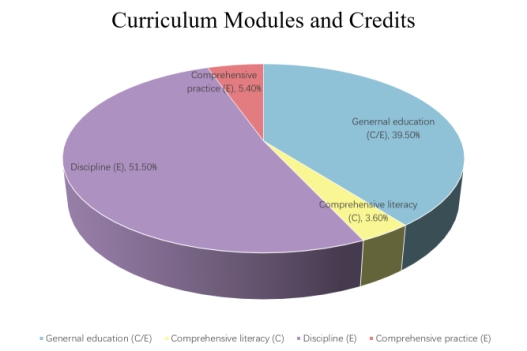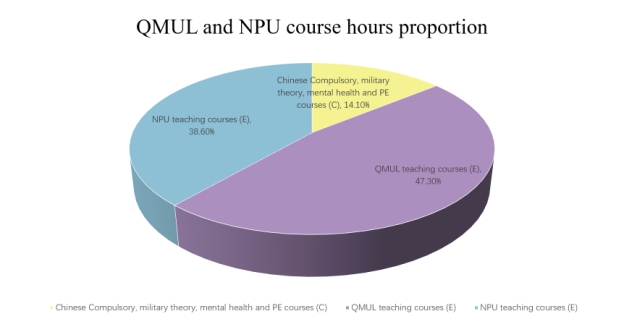2018 Polymer Materials and Engineering
There are 4 modules in this major, as:
◆General education module : 22 modules, 66.0 credits/ 1122 hours;
◆Discipline module: 24 modules, 86.0 credits/ 1376 hours;
◆Comprehensive literacy module: at least 4 modules, 6.0 credits/ 96 hours;
◆Comprehensive practices module : 2 modules, 9.0 credits/ 144 hours;
Except for Ideological and political theory modules, Military modules, Mental Health Education module and PE modules (23.5 credits), 79.0 credits are QMUL taught modules, 64.5 credits are NPU taught modules, and20 introduced modules are English Language, PDP, 14 discipline core modules and major project, partially satisfying the requirement ofRegulations of the People’s Republic of China on Chinese-Foreign Cooperation in Running Schoolsand MoE relative rules, which are:
◆numbers of introduced modules (20) take 39.2% of numbers of total modules (52)(over 1/3);
◆numbers of introduced major core modules (14) take 63.6% of numbers of total major modules (22) (over 1/3);
◆numbers of QMUL teaching major core modules (14) take 27.5% of numbers of total modules (52);
◆class hours of QMUL teaching major core modules (824) take 30.1% of class hours of total modules (2738).


(1) General education modules (22 modules, 66.0 credits)
A. Ideological and political theory modules (5 modules, 16.0 credits)
Module Code |
Module Name |
Credit |
NXC2001 |
Chinese compulsory courses I-Essentials of Chinese Modern History |
3.0 credits |
NXC2002 |
Chinese compulsory courses II-Marxism General Principle |
3.0 credits |
NXC2003 |
Chinese compulsory courses III-Ethics and Fundamental of Law |
3.0 credits |
NXC2004 |
Chinese compulsory courses IV-Fundamental of Mao Ze Dong Thoughts |
5.0 credits |
NXC2005 |
Situation and Policy |
2.0 credits |
B. Military modules (2 modules, 3.0 credits)
Module Code |
Module Name |
Credit |
U34G11002 |
Military Theory |
2.0 credits |
U34P41001 |
Military Training |
1.0 credit |
C. Mental growth and personal development modules (1 module, 0.5 credits)
Module Code |
Module Name |
Credit |
U34G11001 |
Students Mental Health Education |
0.5 credit |
D. Career planning and development modules (3 module, 10.5 credits)
Module Code |
Module Name |
Credit |
QXU3111 |
PDP I |
3.5 credits |
QXU4111 |
PDP II |
3.5 credits |
QXU5111 |
PDP III |
3.5 credits |
E. University general education modules (6modules, 13.0 credits)
Module Code |
Module Name |
Credit |
QXU3101 |
English Language I |
3.5 credits |
QXU3102 |
English Language II |
5.5 credits |
Physical Education is compulsory module in the first to the fourth semester, taking 1 credit every semester. Students can freely choose different module according to their majors, physical conditions, interesting and physical basis.
Module Code |
Module Name |
Credit |
U31G71001 |
Physical educationI |
1.0 credit |
U31G71002 |
Physical educationII |
1.0 credit |
U31G71003 |
Physical educationIII |
1.0 credit |
U31G71004 |
Physical educationIV |
1.0 credit |
F. Level-based general education modules (5 modules, 23.0 credits)
Module Code |
Module Name |
Credit |
NXC3000 |
Advanced Maths I |
5.5 credits |
NXC3004 |
Advanced Maths II |
5.5 credits |
NXC3002 |
Linear Algebra |
3.0 credits |
NXC3005 |
Mathematical Modelling and Computing |
4.0 credits |
NXC3001 |
General Physics |
5.0 credits |
(2) Discipline Modules (24 modules, 86.0 credits)
A. Discipline elementary modules (2 modules, 7.0 credits)
Module Code |
Module Name |
Credit |
NXC4012 |
Mechanical Modelling |
3.5 credits |
NXC4008 |
Engineering Design Methods |
3.5credits |
B. Discipline core modules (22 modules, 79.0credits)
Module Code |
Module Name |
Credit |
NXC4122 |
Thermodynamics and Fluid Mechanics |
3.5 credits |
QXU4000 |
MS 1 Structure and Properties |
3.5 credits |
QXU4001 |
Molecules to Materials |
3.5 credits |
QXU4006 |
MS 2 Processing and Applications |
3.5 credits |
NXC4010 |
Introduction to Functional Materials |
3.5 credits |
QXU4011 |
Introduction to Engineering Materials |
4.0 credits |
QXU4007 |
Experiments in Materials 1 |
3.5 credits |
QXU5017 |
Experiments in Materials 2 |
3.5 credits |
QXU5010 |
Surfaces and Interfaces |
3.5 credits |
QXU5031 |
Polymer Chemistry |
4.0 credits |
QXU5032 |
Physical Properties of Polymers |
4.0 credits |
NXC5013 |
Polymer Characterisation |
3.5 credits |
NXC5014 |
Elastomer Materials |
3.5 credits |
NXC5028 |
Polymer Degradation |
3.5 credits |
QXU5030 |
Composite Materials |
3.5 credits |
QXU6002 |
Materials Selection in Design |
4.0 credits |
QXU6007 |
Environmental Properties of Materials |
3.5 credits |
NXC6018 |
Polymer Processing |
4.0 credits |
NXC6019 |
Failure of Polymers |
3.0 credits |
NXC6020 |
Polymer Product Design |
3.0 credits |
QXU6034 |
Functional Polymers |
3.5 credits |
QXU7033 |
Advanced Polymer Synthesis |
4.0 credits |
(3) Comprehensive literacy modules (6.0 credits, at least 4 modules, students are suggested to choose English taught modules)
A. Scientific literacy modules:subjects on natural science such as introduction to aeronautics, astronautics and navigation, environment, biology, etc. Students must take one module among “An Introduction to Aviation”, “An Introduction to Astronautics”, and “An Introduction to Marine Navigation”. Computer fundamentals are a compulsory module.
B. Modules on economics, management and law:including economy, management, legal education, etc.
C. Humanities modules:including philosophy, ethics, history, culture, language, literature, society, aesthetics, life and development, etc.
D. Art literacy modules:students can choose modules form “An Introduction to Art”, “Music Appreciation”, “Art Appreciation”, “Film Appreciation”, “Drama Appreciation”, “Dance Appreciation”, “Calligraphy Appreciation”, and “Chinese Opera Appreciation”, among which “The Presentation of the Art of Peking Opera” is compulsory.
It issuggestedthat students should choose English taught modules, from all four categories above. Each module offered in each semester will be included in the course selection manual.
(4) Comprehensive practices (2 modules, 9.0 credits)
A. Design for graduation (1 module, 8.0 credits)
Module Code |
Module Name |
Credit |
QXU6035 |
Polymer Project |
8.0credits |
B. Scientific research project modules(1.0 credit)
Students can participate in a variety forms of scientific research training including innovative research programmes, academic competition, innovative and business training plan for college students, academic competitions, “Peak Experience Plan”, social research, and scientific research project. Students are encouraged to participate in a variety forms of central practice such as overseas practice, international internship, winter and summer camp.

